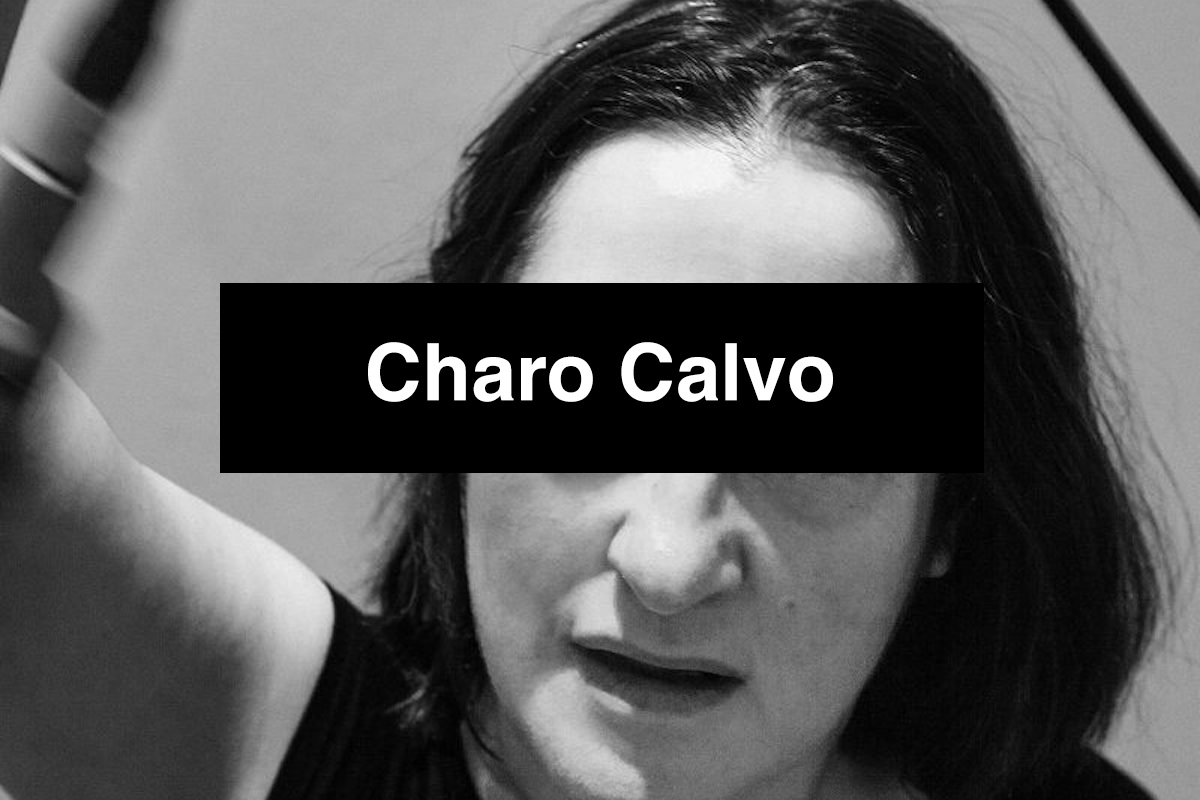Charo Calvo: La Boca Eléctrica (radio art concert)
Thursday 1 October 2020, 19:30h. Sala Aranyó (Campus UPF Poblenou)

Radio art allows to build from reality other realities and virtual spaces with unique rules and parameters where sound is the king. Invisible voices can have multiple bodies and do not respond to gravity. It is a fertile environment for imaginary games, just as electro-acoustic music has been. Electroacoustic music is a closed historical category, but its many concepts and means of expression continue to be involved in the creation and development of creative ways of working with words in an experimental way outside of mainstream productions. There is a big community of musicians working on the field of radio art allowing themselves freedom and playfulness.
UM, On numbers, poetry and hope
Radio play by Charo Calvo (concept, direction, editing, mixing and music) with texts by Velimir Khlebnikov (1921); Natalia Pschenitschnikova, Boris Filanovsky (voices); Natalia Pschenitschnikova (flute).
"Two Russian musicians living in Berlin perform in German and Russian texts by Futurian Russian poet V. Khlebnikov. He lived during the First World War, the Russian Revolution and the Civil War following it. He was a pacifist and suffered watching so much destruction and death. Within his poetic works he started up a mathematical research on the recurrence of historical events at certain determinate lapses of time. Using mathematical formulas, carefully searching through history the dates of big wars or revolutions he found a kind of algorithme that could predict the dates of future wars, a hopeful poetic act. He called it ‘The laws of time’.
In ‘UM’ -‘Mind’ in Russian-, both performers are placed in a large studio with binaural microphones. They tease each other and give their voices to the words of Khlebnikov. A letter to his sister Vera, where he shares his concern about the scorn he suffers about his ideas -nevertheless optimistic - is performed by the man in Russian. The woman gives a playful poetic performance on his formulas and ideas about the hidden numeric structures in the universe, enjoying the sound of German language. The soundtrack is minimalistic, percussive, though does not make use of regular rhythms, it weaves a transparent sound-net where words cling."
Duration: 26’15”. Produced by DAAD Berlin 2018, TU Elektronisches Studio Berlin, Wild Track Belgium. Download the full text in pdf.
All the Me pass before you
Charo Calvo (idea and composition), with texts from Endehuanna and Hymnes to Inanna. Diana Mirons, Junior, Olivier de Sagazan (voices); Laurentiu Cotac (double bass); Charo Calvo, Diana Mirons, Laurentiu Cotac (pipes); Diana Mirons (violin).
Hands do not touch
your precious Me
all the Me pass before you
"Those words were written by Endehuana around 2250 years BC. She was a priestess of the temple of Innana in Mesopotamia. Her Hymnes written in clay tablets, were conserved through the centuries. She is the first named literary author in history. Her compositions though only rediscovered in modern times, are credited by creating the paradigms of poetry, psalms and prayers used throughout the ancient world with led to the development of the genres recognised in present day. Those written words are with me since many years and only recently during the lock down as a result of the pandemic I had the wish to bring them to sound.
In this piece I use those three lines as an incantation, being repeated many times by singer Diana MIrons to provoque a kind of trance state. Through some improvisations during the recording as well as in the process of composing I experienced the power of using repetition to provoque a sense of timelessness . Other improvisations with musicians and dancers and further work with synthesisers and natural sounds were the materials that almost intuitively formed the core of the piece.
The primitive character of the voices and the electronic frequencies intertwined in a surprising and inspiring cluster of intensity and energy. And when the energy was spent, the piece was finished."
Phalena
Charo Calvo (Idea and composition); Isabelle Wéry (text and voice).
"In 2200, a young female finds a sound feature from 2020 in the container park of her under ground town. This little community has survived bellow the surface thanks to powerful state control and the development of cybernetic extensions to the human body. Phalena is studying to become a ‘sourcière’, the one who looks for hot springs. Her nails are a cyber copy of those of a mole, colourful and sensitive. She is captivated by that ancient sound document with women talking about things she did not know it existed like the sea, birds, and pregnant women."
Bio
CHARO CALVO studied Physic Sciences at Universidad Autonoma de Madrid, she was an active member of the theater company of the university and became a dancer after an unexpected workshop given by an American dancer of Martha Graham in Madrid in 1980. She arrived in 1987 to Brussels as a founder member of the dance company ‘Ultima Vez’ directed by Wim Vandekeybus, for their first performance ‘What the body does not remember’. Their collaboration lasted four years, international touring and she danced in four new performances and the video dance ‘Roseland’. Giving away dancing in 1992, she started her studies on Electroacustic Composition at Conservatoire de Mons, being diplomated with distinction in 1999. She followed number of workshops in electronic music in Paris and Antwerpen. She is now Professor Assistant in Composition for the Media at Mons Conservatory for students on the last two years Master Sound Design. Guest Professor at Rits Hogeschool on Sound Creation from 2001, for last year students on Sound, Editing Image, and Documentary directors. She is also responsable for the coaching on Sound Design for DocNomads Joint Master Degree Documentary Film Directing, (Erasmus Mundus). Her radio work has been selected on several festivals and contests as Prix Europa, Palma Ars Acustica EBU, Phonurgia Nova, Hear Say Audio Price, Grand Prix Nova, etc. Her piece ‘Phonobiographie #1’ won the Palma Ars Acustica EBU 2014 and her last work ‘Qualia’ has again being selected on the shortlist Palma Ars Acustica 2017 and Grand Prix Nova 2017. studied Physic Sciences at Universidad Autonoma de Madrid, she was an active member of the theater company of the university and became a dancer after an unexpected workshop given by an American dancer of Martha Graham in Madrid in 1980. She arrived in 1987 to Brussels as a founder member of the dance company ‘Ultima Vez’ directed by Wim Vandekeybus, for their first performance ‘What the body does not remember’. Their collaboration lasted four years, international touring and she danced in four new performances and the video dance ‘Roseland’. Giving away dancing in 1992, she started her studies on Electroacustic Composition at Conservatoire de Mons, being diplomated with distinction in 1999. She followed number of workshops in electronic music in Paris and Antwerpen. She is now Professor Assistant in Composition for the Media at Mons Conservatory for students on the last two years Master Sound Design. Guest Professor at Rits Hogeschool on Sound Creation from 2001, for last year students on Sound, Editing Image, and Documentary directors. She is also responsable for the coaching on Sound Design for DocNomads Joint Master Degree Documentary Film Directing, (Erasmus Mundus). Her radio work has been selected on several festivals and contests as Prix Europa, Palma Ars Acustica EBU, Phonurgia Nova, Hear Say Audio Price, Grand Prix Nova, etc. Her piece ‘Phonobiographie #1’ won the Palma Ars Acustica EBU 2014 and her last work ‘Qualia’ has again being selected on the shortlist Palma Ars Acustica 2017 and Grand Prix Nova 2017.
in collaboration with:

and kind support from:



